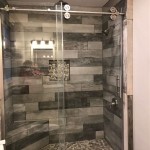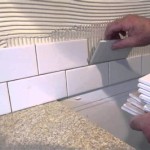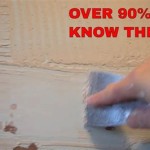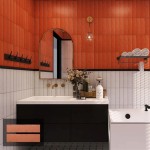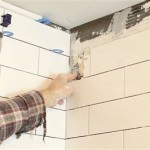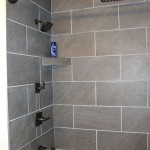Can You Install Shower Tile Directly On Drywall? A Comprehensive Guide
The question of whether shower tile can be installed directly on drywall is a frequent one among homeowners undertaking bathroom renovations. The answer, however, isn't a simple yes or no. Several factors influence the suitability of drywall as a substrate for shower tile, primarily revolving around its inherent properties, moisture resistance, and the long-term integrity of the installation. This article aims to delve into the complexities of this issue, providing a comprehensive overview of the considerations, alternatives, and potential ramifications associated with installing shower tile directly on drywall.
Drywall, also known as gypsum board, is a common building material primarily composed of gypsum plaster pressed between two thick sheets of paper. It is widely used for interior walls and ceilings due to its ease of installation, relatively low cost, and fire-resistant properties. However, standard drywall is inherently porous and susceptible to water damage. Prolonged exposure to moisture can cause the gypsum core to crumble, the paper facing to delaminate, and ultimately lead to structural failure. This vulnerability to moisture is the primary concern when considering its use in a high-moisture environment like a shower.
Installing tile in a shower involves adhering ceramic, porcelain, or stone tiles to a substrate using thin-set mortar. The substrate must provide a stable, flat, and waterproof surface to ensure the tile adheres properly and prevents water from penetrating the wall structure. The integrity of the tile installation hinges on the substrate's ability to withstand moisture and maintain its structural integrity over time. Consequently, using an inappropriate substrate can lead to a range of problems, including cracked tiles, loose grout, mold growth, and ultimately, costly repairs.
Understanding the Limitations of Drywall in Shower Environments
The primary limitation of standard drywall in a shower environment is its inability to withstand prolonged exposure to moisture. Even with meticulous grouting and sealing, some degree of water penetration is inevitable. This moisture can seep through the grout lines, around fixtures, and behind the tiles, eventually reaching the drywall. Once the gypsum core of the drywall absorbs moisture, it begins to deteriorate, losing its strength and structural integrity. This can result in the tiles becoming loose, the grout cracking, and the wall itself becoming unstable.
Furthermore, the paper facing of drywall is an organic material that is susceptible to mold growth when exposed to moisture. Mold not only poses health risks but also further degrades the drywall, accelerating its deterioration. In a shower environment, the warm, humid conditions create an ideal breeding ground for mold, making standard drywall a risky choice. Even with regular cleaning and ventilation, it is difficult to completely eliminate the risk of mold growth when using drywall as a substrate for shower tile.
Another critical consideration is the weight-bearing capacity of drywall. Large format tiles, or natural stone tiles, can be quite heavy, placing a significant load on the wall structure. Standard drywall may not be strong enough to support the weight of these tiles, especially when it is also weakened by moisture absorption. This can lead to sagging, cracking, and ultimately, the collapse of the tile installation.
Alternatives to Drywall for Shower Tile Installation
Given the inherent limitations of standard drywall in shower environments, several superior alternatives exist that provide enhanced moisture resistance and structural stability. These alternatives are specifically designed to withstand the rigors of a wet environment and ensure the long-term integrity of the tile installation.
Cement board, such as Durock or HardieBacker, is a popular choice for shower substrates. It is composed of cement reinforced with fiberglass mesh, making it highly resistant to water damage, mold growth, and fire. Cement board provides a stable, durable surface for tile installation and can withstand the weight of even heavy tiles. It is also relatively easy to install, although it requires specialized tools and techniques for cutting and fastening.
Another alternative is waterproof gypsum board, sometimes referred to as "green board" or "blue board." While it still contains a gypsum core, waterproof gypsum board is treated with a water-resistant coating that helps to repel moisture. However, it is important to note that waterproof gypsum board is not completely waterproof and should not be used in areas that are directly exposed to water, such as the shower walls. It is generally recommended for use in areas with high humidity, such as bathrooms, but not as a primary substrate for shower tile.
Waterproof membranes, such as Schluter-KERDI or Wedi Fundo, provide a comprehensive waterproofing solution for shower installations. These membranes are applied directly over the substrate, creating a seamless, waterproof barrier that prevents water from reaching the underlying structure. Waterproof membranes are typically used in conjunction with cement board or other suitable substrates to create a completely waterproof shower enclosure. While they may be more expensive than other alternatives, waterproof membranes offer superior protection against water damage and are often considered the best option for high-end shower installations.
Regardless of the chosen substrate, proper installation is crucial to ensure its effectiveness. This includes using the correct fasteners, sealing all seams and joints, and following the manufacturer's instructions carefully. A poorly installed substrate, even one that is inherently water-resistant, can still lead to water damage and tile failure.
Circumstances Where Drywall Might Be Considered (And How to Mitigate Risk)
While generally discouraged, there might be specific, limited circumstances where using standard drywall under shower tile could be considered, particularly if rigorous precautions are taken to protect it from moisture. These situations are rare and require a thorough understanding of the risks involved.
One possible scenario is a shower that is rarely used, such as in a guest bathroom. In such cases, the exposure to moisture is significantly reduced, minimizing the risk of water damage to the drywall. However, even in rarely used showers, some degree of moisture penetration is inevitable, so it is still essential to take precautions to protect the drywall.
If drywall is used, it must be sealed with a high-quality waterproofing membrane before the tile is installed. This membrane should be applied according to the manufacturer's instructions, ensuring that all seams and joints are properly sealed. The membrane should also extend beyond the shower area to prevent water from wicking into the surrounding walls.
Another crucial step is to use a high-quality grout that is specifically designed for wet environments. Epoxy grout, for example, is highly resistant to water penetration and mold growth, making it a good choice for showers. The grout should be properly sealed and maintained to prevent water from seeping through the grout lines.
Furthermore, ensure adequate ventilation in the shower area to help remove excess moisture. An exhaust fan should be installed and used regularly during and after showering. This will help to dry out the shower area and prevent moisture from accumulating on the drywall.
Even with these precautions, using drywall under shower tile carries a significant risk of water damage and tile failure. It is generally advisable to opt for a more water-resistant substrate, such as cement board or a waterproof membrane, to ensure the long-term integrity of the tile installation. Choosing to use drywall requires a careful risk assessment and a commitment to meticulous installation and ongoing maintenance.

Tile Over Drywall Showers A Common But Bad Practice Scott Hall Remodeling
Can You Put A Ceramic Wall Tile On Sheetrock For Basement Shower Quora

Can You Tile Over Drywall Master Building Materials Blog

Can You Tile Over Drywall Master Building Materials Blog
Should I Use Green Board Or Cement For Behind My Shower Tiles In The Bathroom Quora

How To Finish Drywall Where It Meets The Shower Wallboard Trim Tool

The Complete Guide To Installing Tile On Shower Or Bathtub Walls

What Type Of Drywall Board Is Needed To Tile A Shower Wall Doityourself Com

How To Tile Over Sheetrock Doityourself Com

Waterproof Bathtub Shower Walls Over Drywall
Related Posts

